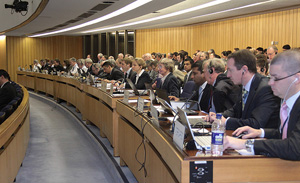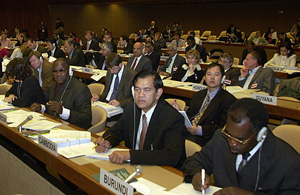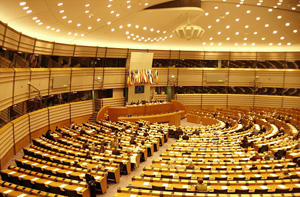The Hong Kong Convention
 The Hong Kong International Convention for the Safe and Environmentally Sound Recycling of Ships, 2009 (the Hong Kong Convention), was adopted at a diplomatic conference held in Hong Kong, China, from 11 to 15 May 2009, which was attended by delegates from 63 countries.
The Hong Kong International Convention for the Safe and Environmentally Sound Recycling of Ships, 2009 (the Hong Kong Convention), was adopted at a diplomatic conference held in Hong Kong, China, from 11 to 15 May 2009, which was attended by delegates from 63 countries.
The Convention is aimed at ensuring that ships, when being recycled after reaching the end of their operational lives, do not pose any unnecessary risks to human health, safety and to the environment.
The Hong Kong Convention intends to address all the issues around ship recycling, including the fact that ships sold for scrapping may contain environmentally hazardous substances such as asbestos, heavy metals, hydrocarbons, ozone-depleting substances and others. It also addresses concerns raised about the working and environmental conditions at many of the world’s ship recycling locations.
The text of the Hong Kong Convention was developed over three and a half years, with input from IMO Member States and relevant non-governmental organizations, and in co-operation with the International Labour Organization and the Parties to the Basel Convention.
Regulations in the new Convention cover: the design, construction, operation and preparation of ships so as to facilitate safe and environmentally sound recycling without compromising the safety and operational efficiency of ships; the operation of ship recycling facilities in a safe and environmentally sound manner; and the establishment of an appropriate enforcement mechanism for ship recycling, incorporating certification and reporting requirements.
Upon entry into force of the Hong Kong Convention, ships to be sent for recycling will be required to carry an inventory of hazardous materials, which will be specific to each ship. An appendix to the Convention provides a list of hazardous materials the installation or use of which is prohibited or restricted in shipyards, ship repair yards, and ships of Parties to the Convention. Ships will be required to have an initial survey to verify the inventory of hazardous materials, additional surveys during the life of the ship, and a final survey prior to recycling.
Ship recycling yards will be required to provide a “Ship Recycling Plan”, specifying the manner in which each ship will be recycled, depending on its particulars and its inventory. Parties will be required to take effective measures to ensure that ship recycling facilities under their jurisdiction comply with the Convention.
The following guidelines have been developed and adopted to assist States in the early implementation of the Convention’s technical standards:
2011 Guidelines for the Development of the Inventory of Hazardous Materials, adopted by resolution MEPC.197(62);
2011 Guidelines for the Development of the Ship Recycling Plan, adopted by resolution MEPC.196(62);
2012 Guidelines for Safe and Environmentally Sound Ship Recycling, adopted by resolution MEPC.210(63);
2012 Guidelines for the Authorization of Ship Recycling Facilities, adopted by resolution MEPC.211(63).
Joint ILO/IMO/BC Working Group on Ship Scrapping
The Basel Convention (BC)
 The ‘Basel Convention on the Control of Transboundary Movements of Hazardous Wastes and their Disposal’ was completed in the late 1980s and came into force in 1992.
The ‘Basel Convention on the Control of Transboundary Movements of Hazardous Wastes and their Disposal’ was completed in the late 1980s and came into force in 1992.
It is a very important piece of international law, and its legal position in Europe is effectively enshrined in the European Waste Shipment Regulations (EWSR). Of potentially equal importance is a piece of proposed follow-up legislation called the ‘ban amendment’.
This states that it is illegal to transport waste from an OECD country to a non-OECD country. While this amendment has not come into force, several countries have ratified it, including the whole of the EU, which means it is law for all EU countries. It is also law for China and Turkey, but not India. Coupled with this amendment is a decision by the Basel Convention that a ship ‘may’ be defined as waste because of the hazardous materials it contains.
The combination of these two elements – the ban amendment and the definition of a ship as waste – means that if you declare your intention to dispose of a ship, and you are in a port of an OECD country which has ratified the ban amendment, it might be illegal for you to send your ship for recycling in a non-OECD country.
However, the Basel Convention can only really be applied after the law has been broken, making it ineffective in a fluid international industry such as shipping, since it is unlikely that an owner would deliberately declare an intent to contravene the legislation. Although, as mentioned before, a sale ‘as is, where is’ for scrap is increasingly likely to be interpreted as a declaration in the future. It is generally acknowledged that the Basel Convention is difficult to put into practice for ships.
The position of the EU
 The European Union, as per policy set by the European Commission (EC) and acting on advice from EMSA among others, has noted that a very large proportion of ships going for recycling are EU member state flagged. They are accordingly determined to act.
The European Union, as per policy set by the European Commission (EC) and acting on advice from EMSA among others, has noted that a very large proportion of ships going for recycling are EU member state flagged. They are accordingly determined to act.
The EU communication ‘A Strategy for better ship dismantling’ was adopted in 2009, following the 2007 Green Paper on better ship dismantling, as well as subsequent consultations and stakeholder meetings. Although the final outcomes of this strategy are unknown, there is a clear emphasis on unilateral action, early implementation of the Hong Kong Convention and funding through mechanisms such as taxes or port dues.
In particular, the strategy
• points out that end-of-life ships should be regarded as hazardous waste, as a result of the many hazardous substances contained in such ships, and should therefore fall within the scope of the Basel Convention
• calls for an explicit prohibition on ‘beaching’ of end-of-life ships
• stresses that the Ship Recycling Convention should be evaluated with regard to a level of control equivalent to the Basel Convention
• calls for a funding mechanism that is based on mandatory contributions from the shipping industry and is in line with the producer responsibility principle.
These points might well lead us to believe that there is a likelihood of stricter unilateral requirements within the EU. They also raise some practical issues.
Firstly, calling ships waste under the Basel Convention also invokes the European Waste Shipment Regulations. At the very least, this would restrict movement of ships from the European Union to non- OECD countries outside the EU, and at the most it could cause any movement of the ship to require an individual license.
Second, prohibiting beaching outlaws up to 95% of present recycling and business capacity, with no known practical replacement.
Third, evaluating the Convention independently against the levels of control of the Basel Convention is extremely risky. One of the aims of the Hong Kong
Convention was to provide an equivalent level of control – therefore any indication from the EU that it didn’t find equivalent levels may complicate matters.
Finally, independent funding mechanisms are always highly contentious and are often very strongly resisted.
However, the message given by the European Commission’s Head of Waste Management, Mr Julio Garcia Burques, at the sixth Annual Ship Recycling
Conference in June 2011 is that the Hong Kong Convention is at least equivalent to the Basel Convention. Furthermore, the EC recognises in the interim period that it is not appropraite to follow an ineffective regime.
ILO CONVENTION
 The International Labour Organization is the oldest organisation of the United Nations, and its Conventions cover a vast field of law from health and safety to workers’ rights and child labour. Some of the major ILO conventions are still not ratified by the principal ship breaking nations (see Table 1). Despite this, the ILO’s expertise in labour matters means it has an important role to play in ship recycling.
The International Labour Organization is the oldest organisation of the United Nations, and its Conventions cover a vast field of law from health and safety to workers’ rights and child labour. Some of the major ILO conventions are still not ratified by the principal ship breaking nations (see Table 1). Despite this, the ILO’s expertise in labour matters means it has an important role to play in ship recycling.
Safety and health in shipbreaking: Guidelines for Asian countries and Turkey by ILO 2003
Other organizations and legislative arena
NGO Platform on Ship breaking
This is the principal environmental pressure group involved in ship recycling, and was formed in September 2005. It is a conglomeration of several of the familiar pressure groups, such as Greenpeace and the Basel Action network, as well as bodies unique to ship recycling such as the Prevention of Hazardous Ship breaking Initiative. YPSA is the member organization of NGO Platform on Ship breaking.
Flag state
The flag state is the government of the country whose flag a ship is entitled to fly. It is responsible for issuing all the statutory certificates that ships need to trade. This responsibility will often be delegated to what is known as a ‘recognised organisation’ (RO). This is an organization which is authorised to undertake these tasks on the flag state’s behalf.
International Ship Recycling Association (I.S.R.A)
I.S.R.A is an international membership organisation for recycling facilities which places emphasis on responsible practices. It has possibly the broadest knowledge and capability in ship recycling today. Other organisations may encompass more facilities and countries, but with a significant proportion of the higher end of the market, I.S.R.A has a strong position in the industry.
International Organization for Standardization (ISO)
The ISO published the ISO 30000 series of standards on management systems for ship recycling in 2009. ISO 30000 specifies requirements for a management system to enable a ship recycling facility to develop and implement procedures, policies and objectives in order to be able to undertake safe and environmentally sound ship recycling (ISO, 2011).
The Industry Working Group on Ship Recycling
The Industry Working Group is led by the International Chamber of Shipping (ICS) and comprises the following industry bodies: BIMCO (Baltic and International Maritime Company); IACS (International Association of Classification Societies); IPTA (International Parcel Tankers Association); ITOPF (International Tanker Owners Pollution Federation Limited); Intertanko; Intercargo; and OCIMF (Oil Companies International Marine Forum).The Working Group has been instrumental in developing the Hong Kong Ship Recycling Convention.
